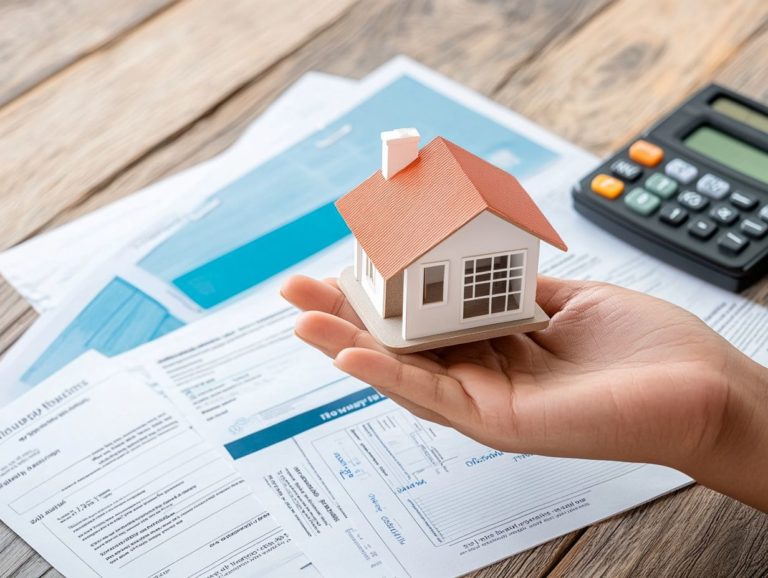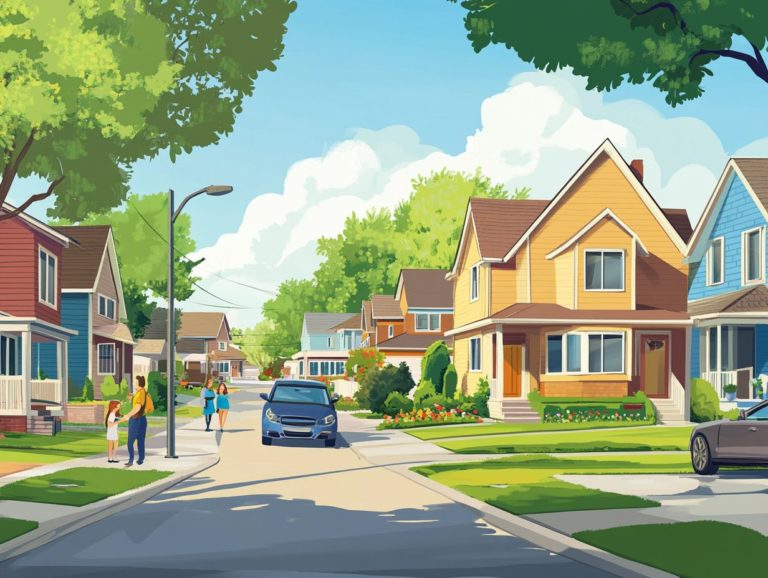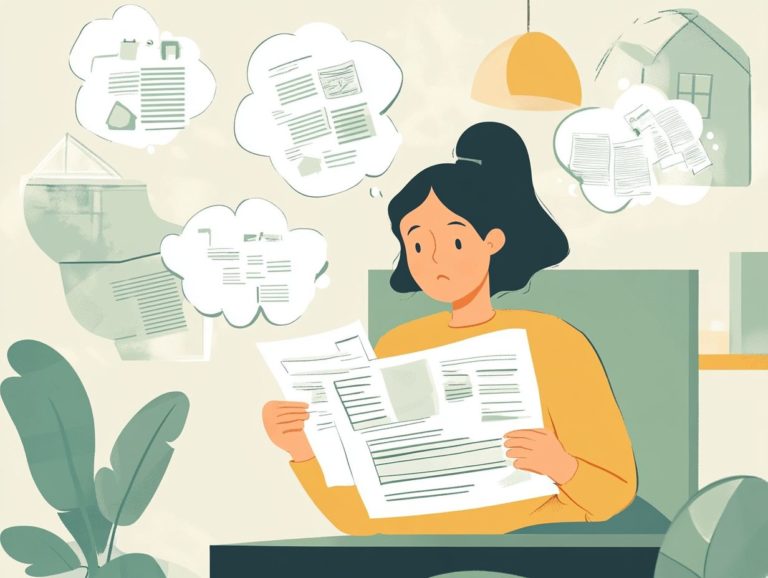How to Determine Adequate Coverage for Home Insurance
Home insurance serves as an essential shield for homeowners, providing security against unforeseen events that could threaten both your property and personal belongings.
This article delves into the critical elements of home insurance, exploring what it covers, the various policy types available, and the factors that determine your coverage needs.
You’ll also discover practical strategies to save on premiums while ensuring your home remains adequately protected.
With this knowledge, you can navigate the intricacies of home insurance with confidence.
Contents
- Key Takeaways:
- Understanding Home Insurance Coverage
- Factors to Consider for Adequate Coverage
- Calculating Your Coverage Needs
- Tips for Saving on Home Insurance
- Frequently Asked Questions
- 1. Wondering how much coverage you really need?
- 2. What factors should I consider when determining coverage for my home insurance?
- 3. Should I opt for replacement cost or actual cash value coverage for my home insurance?
- 4. How often should I review my home insurance coverage?
- 5. Are there any discounts available for home insurance coverage?
- 6. What should I do if I believe my home insurance coverage is not enough?
Key Takeaways:

Ensure adequate coverage by understanding what is covered and the different types of policies available.
Consider factors such as the value of your home, location, and potential risks when determining your coverage needs, including what to look for in home insurance coverage.
Calculate your coverage needs by comparing replacement cost to market value. To get the most out of your policy, check out how to ensure proper coverage for home additions and explore extra coverage options too!
Understanding Home Insurance Coverage
Understanding home insurance coverage is crucial for you as a homeowner. It offers vital financial protection against risks like property damage, theft, and liability, making it important to also grasp coverage limits in home insurance claims.
Typically, homeowners insurance encompasses several key elements, including:
- Dwelling coverage
- Personal property protection
- Liability insurance
- Additional living expenses
It s essential to be aware of the coverage limits and the types of policies available, such as flood and earthquake insurance, to ensure thorough protection against potential threats.
What Does Home Insurance Cover?
Home insurance encompasses several essential elements, starting with dwelling coverage, which protects your home’s structure from damages caused by incidents like fire, theft, and specific natural disasters.
This coverage typically includes the costs associated with repairing or rebuilding your home if it suffers damage from a severe storm or a burst pipe.
Beyond dwelling coverage, homeowners insurance provides personal property coverage, safeguarding your belongings inside the home think furniture, electronics, and clothing against incidents like vandalism or accidental loss.
For example, if a fire destroys your furniture, the policy could reimburse you for the replacement value after deductibles are taken into account.
Additional living expenses coverage helps cover temporary housing costs if your home becomes uninhabitable due to covered events. This helps you keep your lifestyle while repairs are made, covering hotel bills and dining out.
Types of Home Insurance Policies
Explore a variety of home insurance policies tailored just for you! Standard homeowners policies provide essential coverage, but there are also specialized options like flood and earthquake insurance to consider.
Understanding the differences among standard policies such as HO-1, HO-2, and HO-3 is crucial for selecting the right protection for your home. The HO-1 offers basic coverage for specific perils, while the HO-2 broadens that coverage by including additional risks. The HO-3 is typically the most comprehensive option, covering nearly all risks except those that are explicitly excluded.
In addition to these foundational policies, explore extra coverage options like flood and earthquake insurance to ensure your home is well-protected against specific natural disasters.
Understanding ideas like extended replacement cost and guaranteed replacement cost is essential; these options provide peace of mind, safeguarding you from potential losses that may exceed your home s insured value.
Factors to Consider for Adequate Coverage
When evaluating the right homeowners insurance coverage, several key factors should guide your decision, including understanding how to evaluate your home insurance needs.
Consider the value of your property, local construction costs, rebuilding expenses, and the specific risks inherent to your location.
Understanding the nuances of coverage limits is essential; it ensures you re fully safeguarded against potential property damage while accounting for inflation’s impact over time.
Don t wait! Protect your home today!
Value of Your Home and Personal Belongings
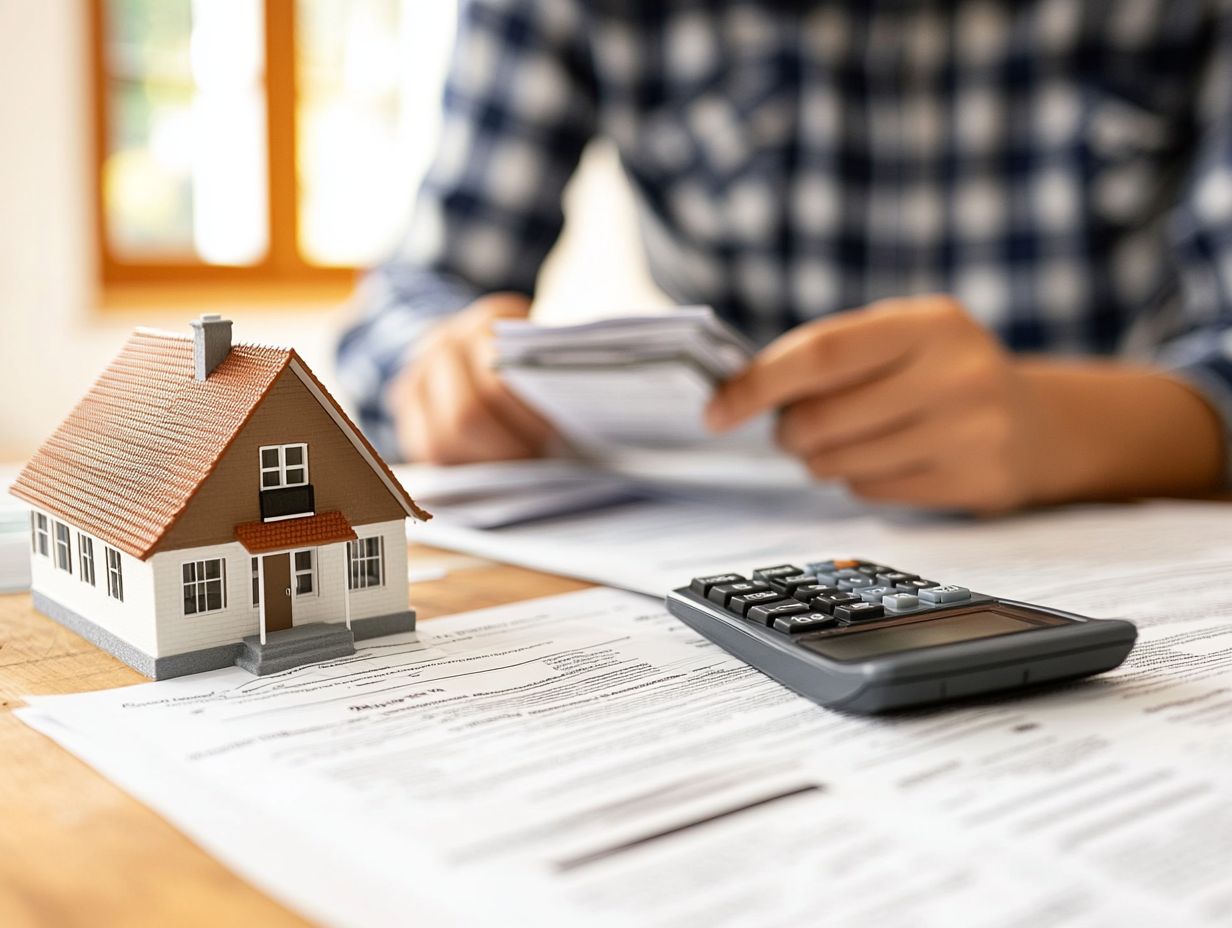
Your home and belongings’ value shapes your homeowners insurance needs. To ensure you are adequately covered, learn how to find the best home insurance type by conducting a thorough assessment and keeping an up-to-date inventory of your possessions.
This evaluation helps you find the right replacement cost. It also clarifies the details of personal property coverage. Replacement cost means how much it would cost to rebuild your home at current prices. Actual cash value includes depreciation, which may leave you underinsured.
Understanding these distinctions ensures your insurance accurately reflects the true value of your valuable items. It provides a financial safety net in case of a disaster. Regular assessments boost your peace of mind and prepare you for unexpected events.
Location and Potential Risks
The location of your home significantly influences the types of risks you may encounter. This shapes your homeowners insurance coverage needs and may require specialized policies like flood or earthquake insurance.
If your home is along the coast, you’re likely facing heightened risks from flooding and hurricanes. It s essential to have coverage that specifically addresses those threats.
If you reside in an earthquake-prone area, considering earthquake insurance becomes crucial. It protects against potential structural damage.
Knowing local construction trends is crucial! It can help you assess potential risks and liabilities effectively. Comprehensive liability insurance safeguards you from accidental injuries that may occur on your property due to environmental risks.
Ultimately, geography intricately shapes your insurance decisions.
Calculating Your Coverage Needs
Calculating your coverage needs is essential for securing the right homeowners insurance. This process requires you to understand the distinction between replacement cost and market value. For more insights, consider understanding coverage limits in home insurance and assess your current insurance policy limits through a thorough home evaluation.
Replacement Cost vs. Market Value
Understanding the distinction between replacement cost and market value is crucial for homeowners when determining insurance coverage limits. These concepts can significantly impact the financial protection your policy offers.
Replacement cost is the amount required to rebuild your home in case of total loss, covering expenses for materials and labor. Market value is what your property could sell for in the current real estate market, influenced by factors like location and demand.
This difference is vital. If you only consider market value when selecting insurance, you risk being underinsured. This could leave you with insufficient funds for necessary repairs or rebuilding should disaster strike.
By understanding both values, you empower yourself to make informed insurance decisions. Regularly reviewing and adjusting your coverage limits ensures they reflect changes in your home s condition or the local market.
Explore Extra Coverage Options for Your Home
Homeowners insurance can often be tailored to meet your unique needs through additional coverage options, such as valuable items coverage, enhanced liability insurance, and specialized policies like flood and earthquake insurance.
These extra protections are essential as they address gaps that standard policies may overlook. If you own high-value items like jewelry or art, valuable items coverage is crucial to ensure these assets are well-protected against theft or damage.
If you live in an area prone to natural disasters, discover that standard homeowners insurance may fall short in covering specific risks. Flood or earthquake insurance becomes vital for safeguarding your property.
Picture yourself in a flood-prone region enduring heavy rains. Without that specialized policy, you could suffer significant financial losses that standard insurance simply won’t cover.
Incorporating these additional coverages enhances your policy and grants you peace of mind in an unpredictable world.
Tips for Saving on Home Insurance

Finding ways to save on homeowners insurance is crucial for managing your budget effectively while ensuring you maintain the right level of coverage.
It s essential to explore available discounts, consider bundling options, and review your policy regularly to optimize your insurance strategy.
Discounts and Bundling Options
You can often save on insurance premiums by taking advantage of various discounts and bundling options that offer opportunities for reduced rates on your homeowners insurance policies.
By exploring different types of discounts like those for security systems that enhance your property’s protection, loyalty discounts for long-term customers, and incentives for a history of not filing claims you can significantly lower your costs.
Bundling your homeowners insurance with auto or other policies simplifies management and saves you money. This smart strategy can lead to lower premiums and comprehensive coverage, granting you peace of mind while ensuring that you re well-protected against unforeseen events.
Regularly Reviewing and Adjusting Your Coverage
Regularly reviewing and adjusting your homeowners insurance coverage is essential to ensure that your policy aligns with your current needs, including knowing how to know if you have enough coverage while providing adequate protection against inflation and fluctuating property values.
Life events such as home renovations, changes in your household size, or significant purchases can greatly influence the coverage levels you require.
You must regularly check your policy, as this can help you avoid potential financial pitfalls when it comes time to file a claim.
Features like a feature that automatically adjusts coverage based on rising costs can be invaluable. This approach ensures that your home remains adequately insured without the hassle of constant manual adjustments.
By keeping a close eye on these factors, you not only protect your investment but also grant yourself peace of mind, knowing you re prepared for whatever life throws your way.
Frequently Asked Questions
1. Wondering how much coverage you really need?
To determine the adequate coverage for your home insurance, consider the total value of your home, including the cost of rebuilding or repairing it in case of damage or destruction. Additionally, you should factor in the value of your personal belongings and any additional structures on your property. For more detailed guidance, check out how to ensure your home is properly insured.
2. What factors should I consider when determining coverage for my home insurance?
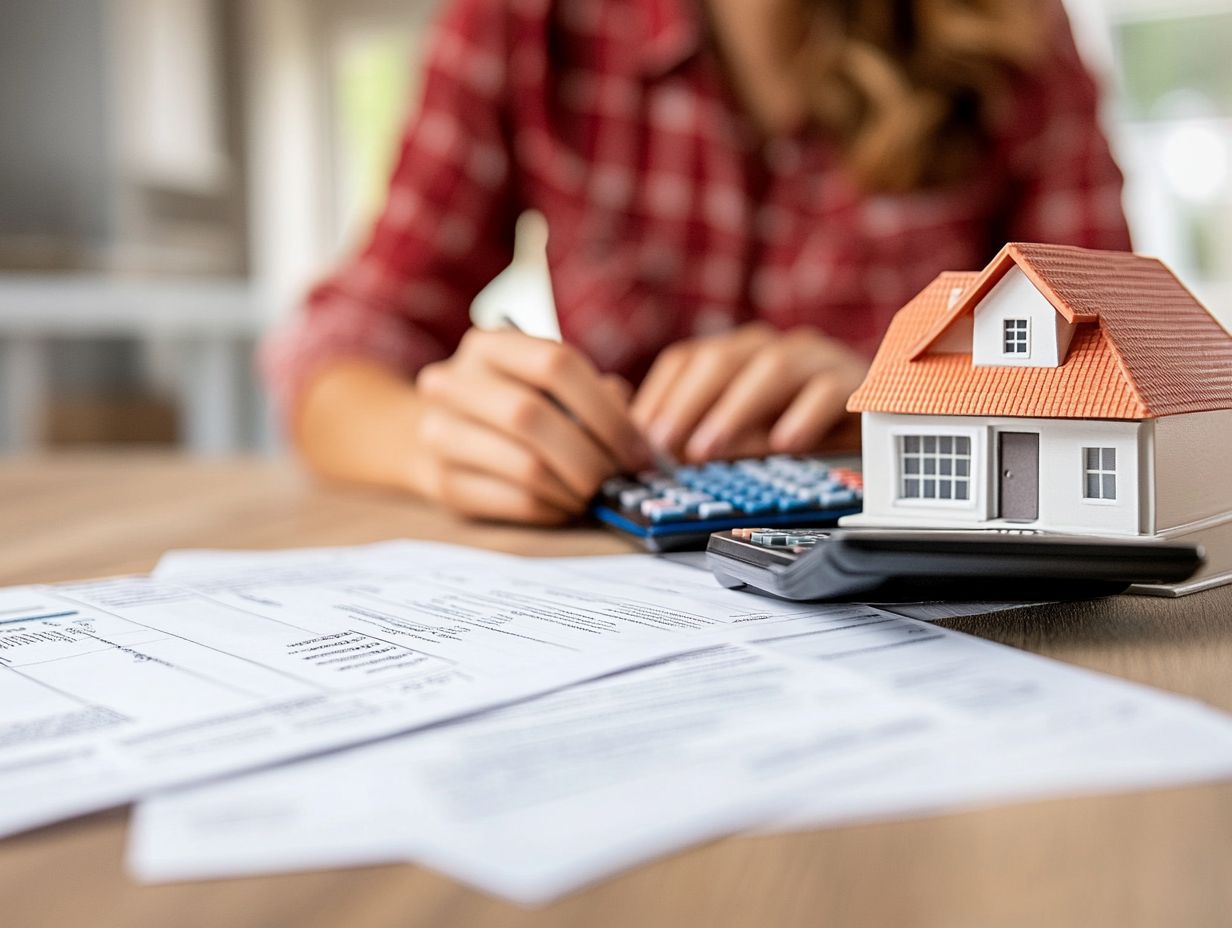
Some important factors to consider include the value of your home, your personal belongings, the location of your home, and any potential risks or hazards in your area.
You may also want to consider any unique features of your home that may require additional coverage, such as a swimming pool or detached garage.
3. Should I opt for replacement cost or actual cash value coverage for my home insurance?
This will depend on your personal needs and budget. Replacement cost coverage provides enough funds to fully replace or repair any damaged items, but it may come with a higher premium.
Actual cash value coverage, on the other hand, takes depreciation into account and may result in receiving less money for damaged items. Evaluate your options and choose the coverage that best suits your situation.
4. How often should I review my home insurance coverage?
It is recommended to review your home insurance coverage annually or whenever there are significant changes to your home or personal belongings. This could include renovations, purchasing new furniture or expensive items, or changes in the value of your property.
5. Are there any discounts available for home insurance coverage?
Yes, many insurance companies offer discounts for various factors, such as having a security system, being a non-smoker, or bundling your home insurance with other types of insurance. Be sure to inquire about any potential discounts when shopping for coverage.
6. What should I do if I believe my home insurance coverage is not enough?
If you think your coverage is not enough, contact your insurance provider right away. Discuss your concerns to see if you can adjust or add coverage to better protect your home and belongings by understanding the requirements for home insurance coverage.
Having more coverage can make a big difference in an emergency. Don t wait until it s too late take action now to ensure you re fully protected!


